General, Sir John Monash, Personal Files Book 22, 2 January - 1 February 1919- Part 11
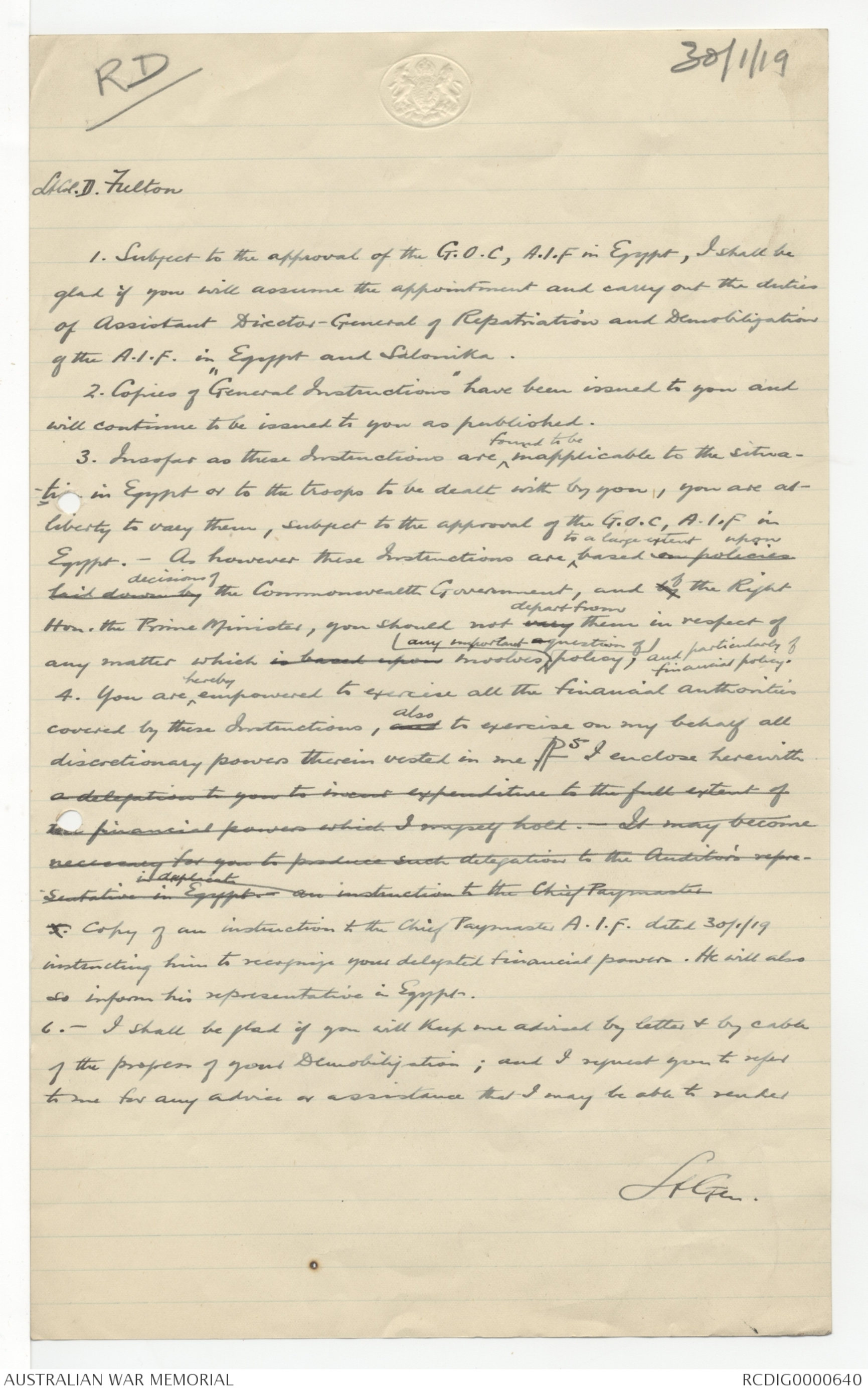
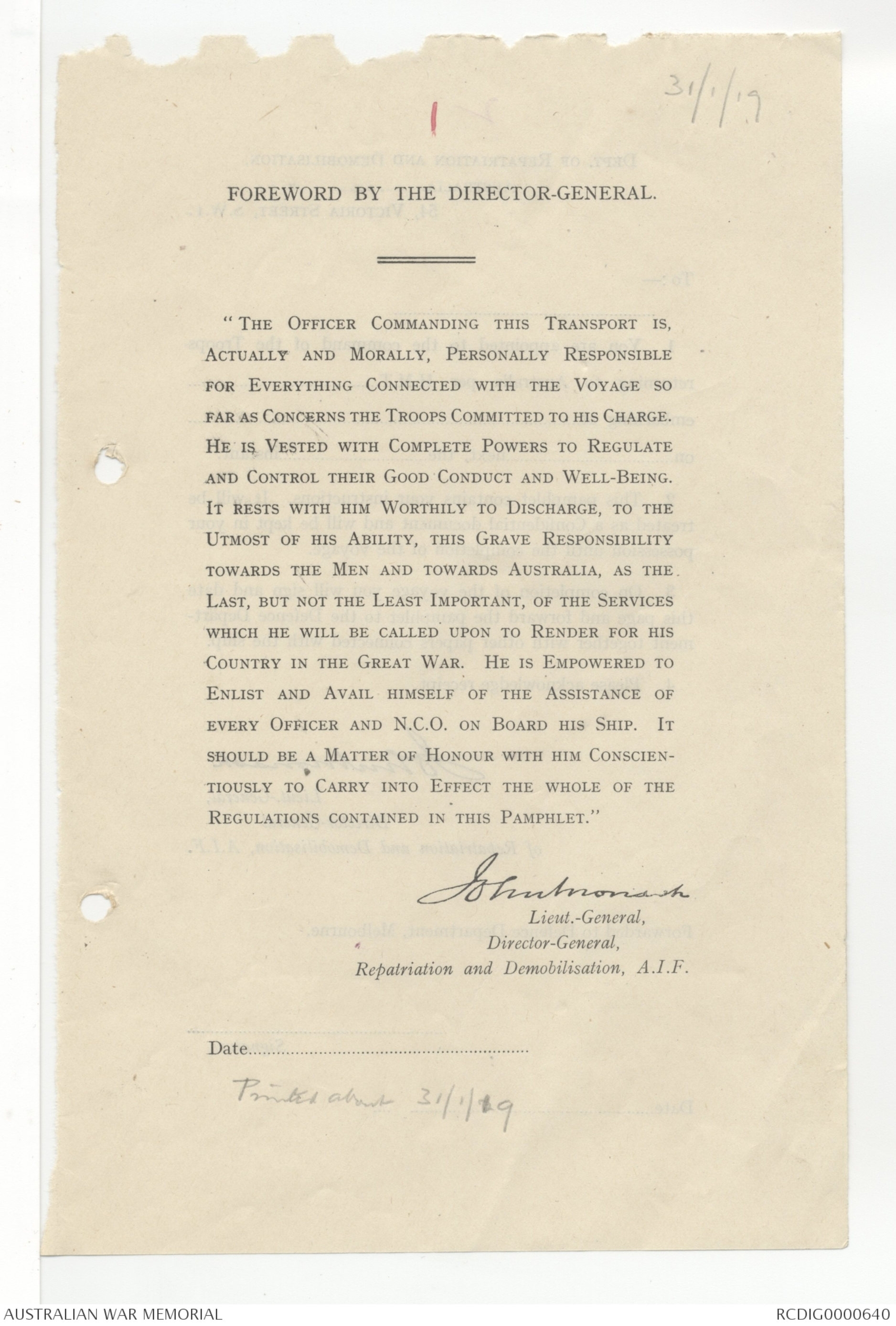
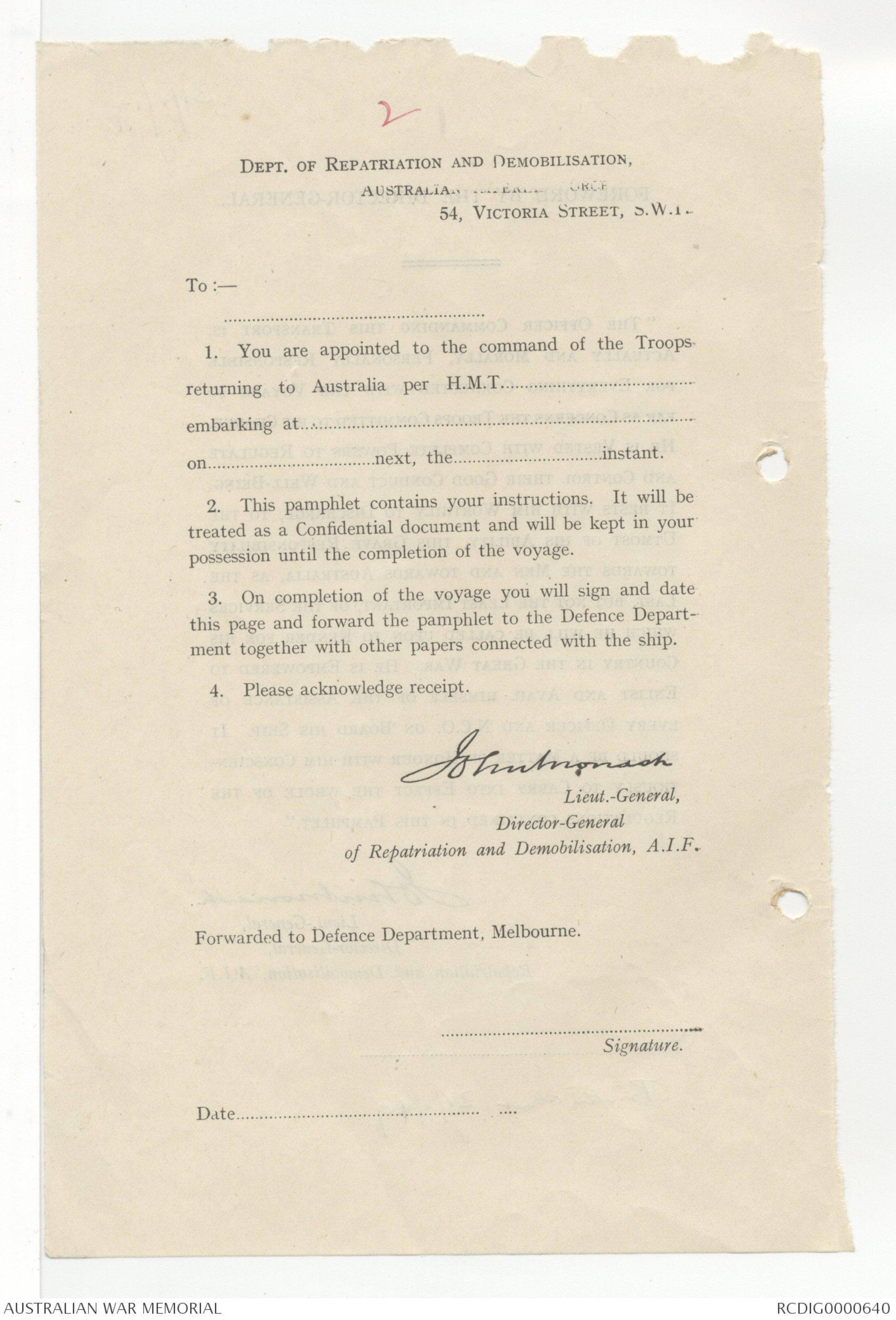
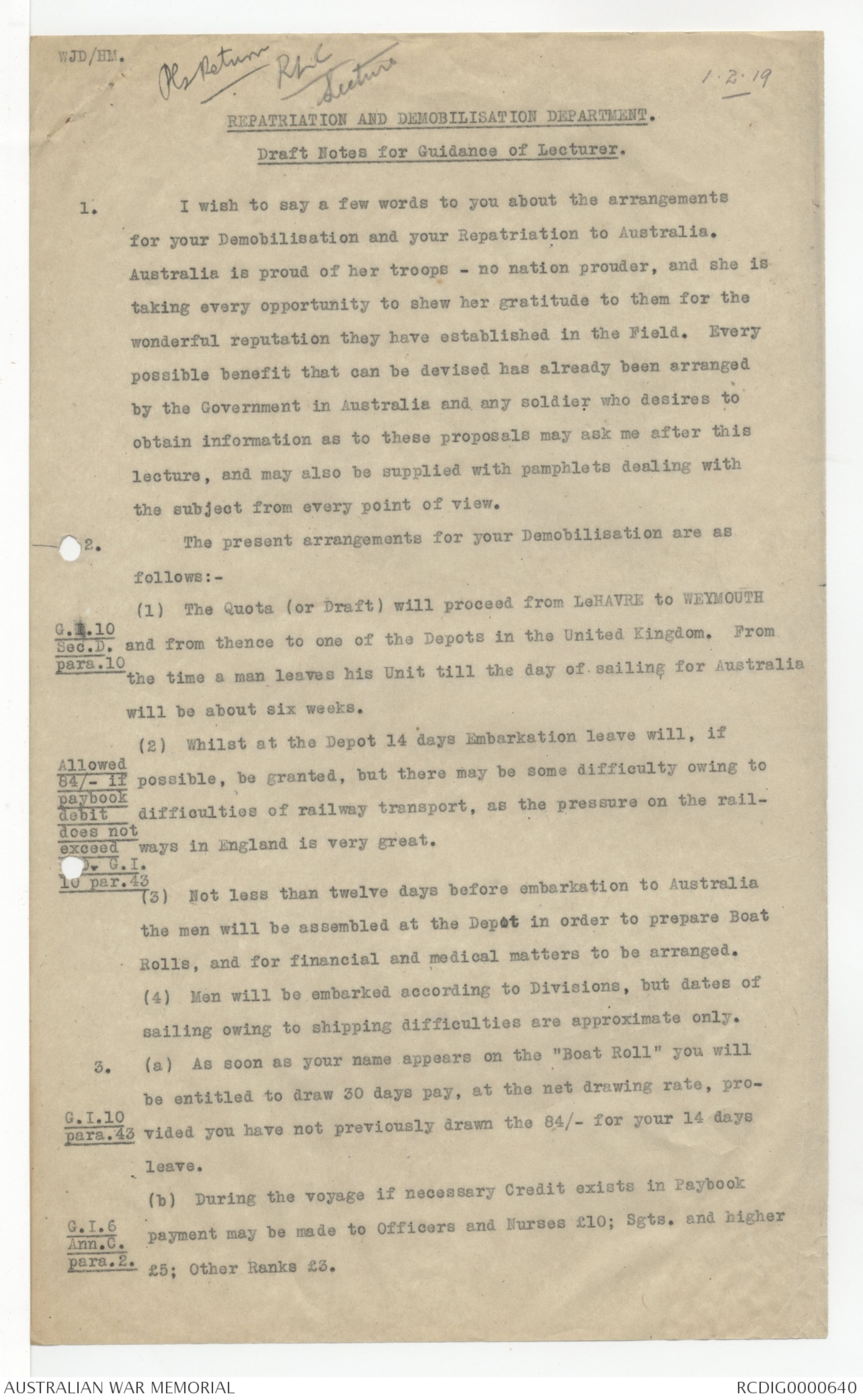
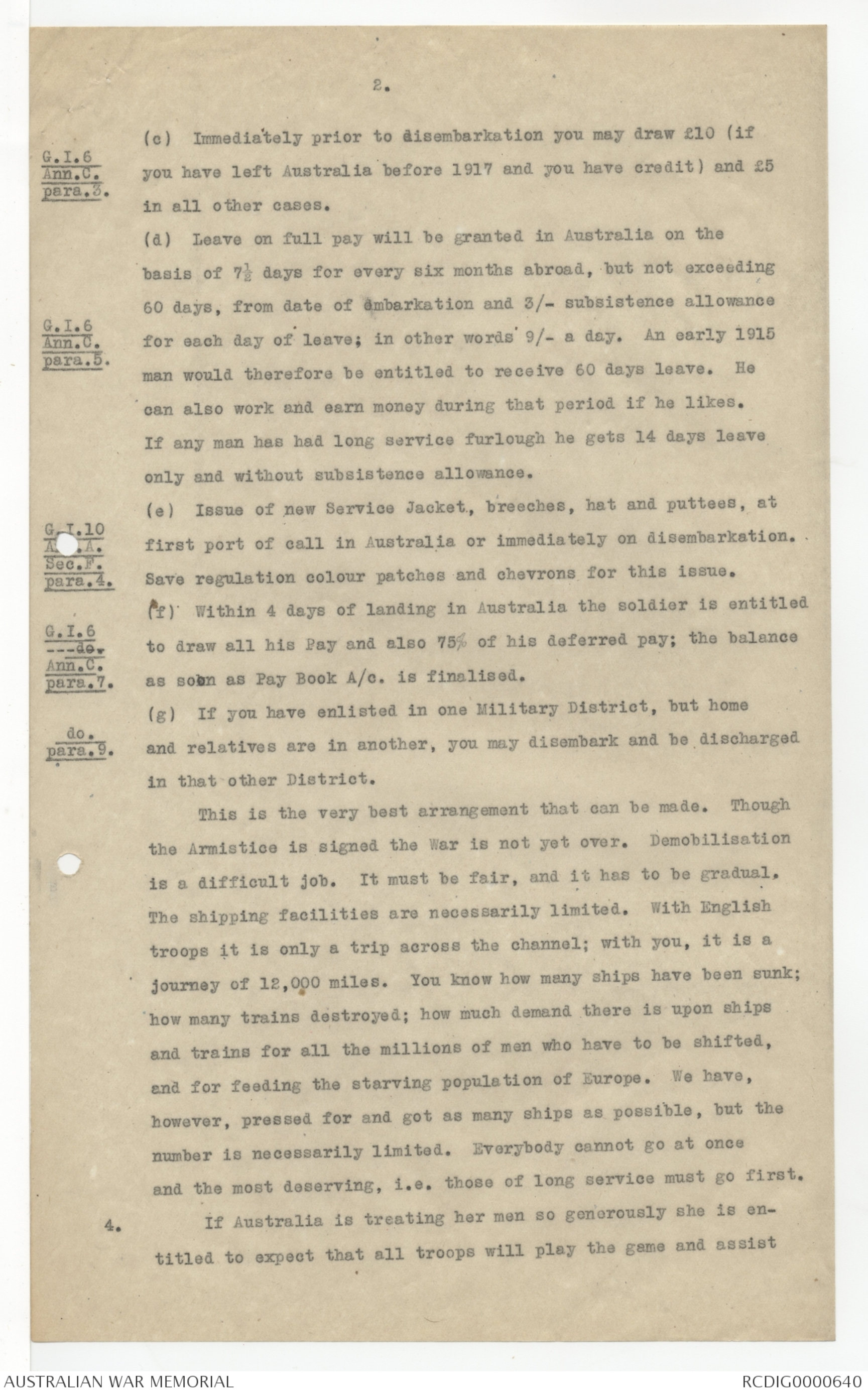
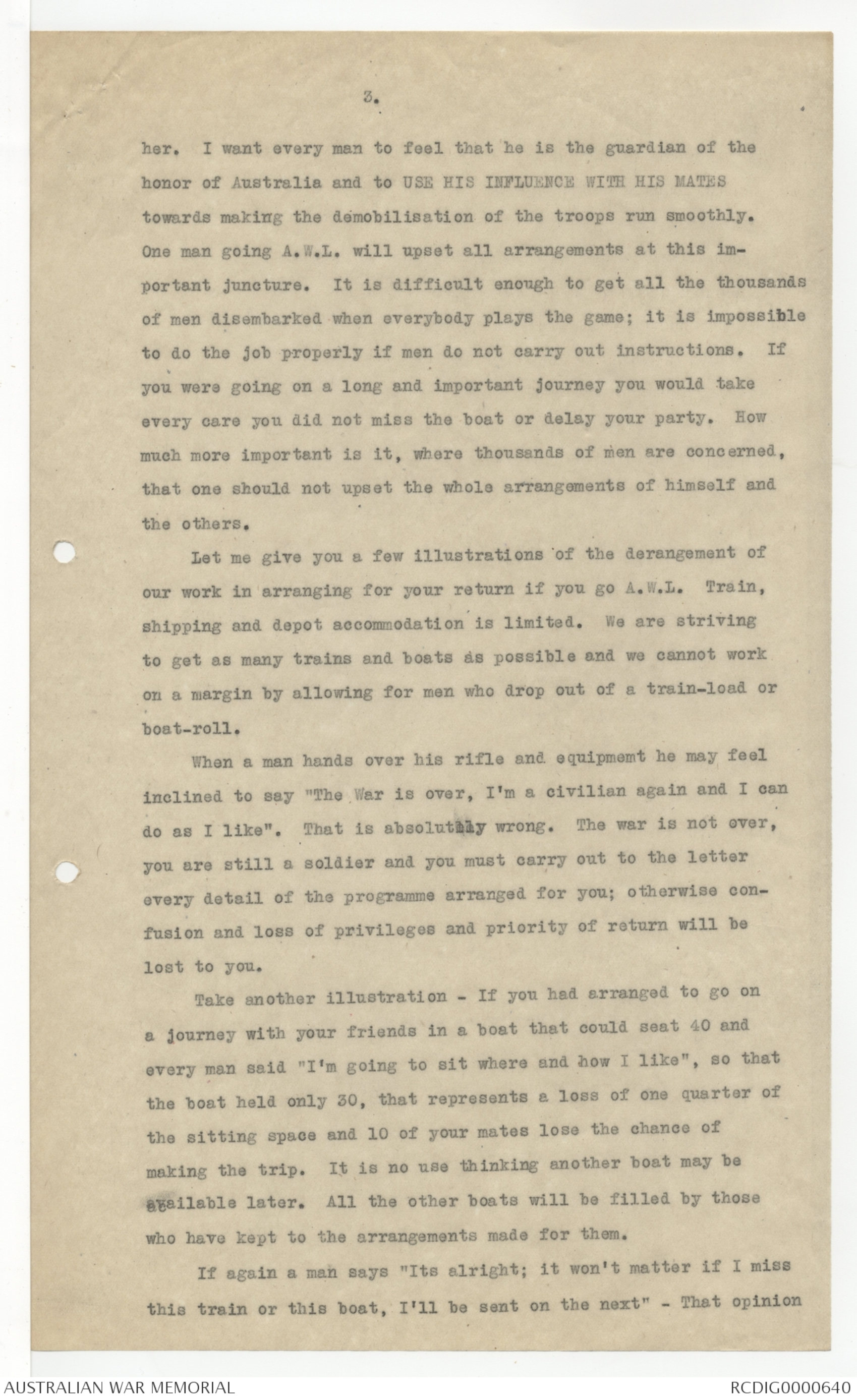
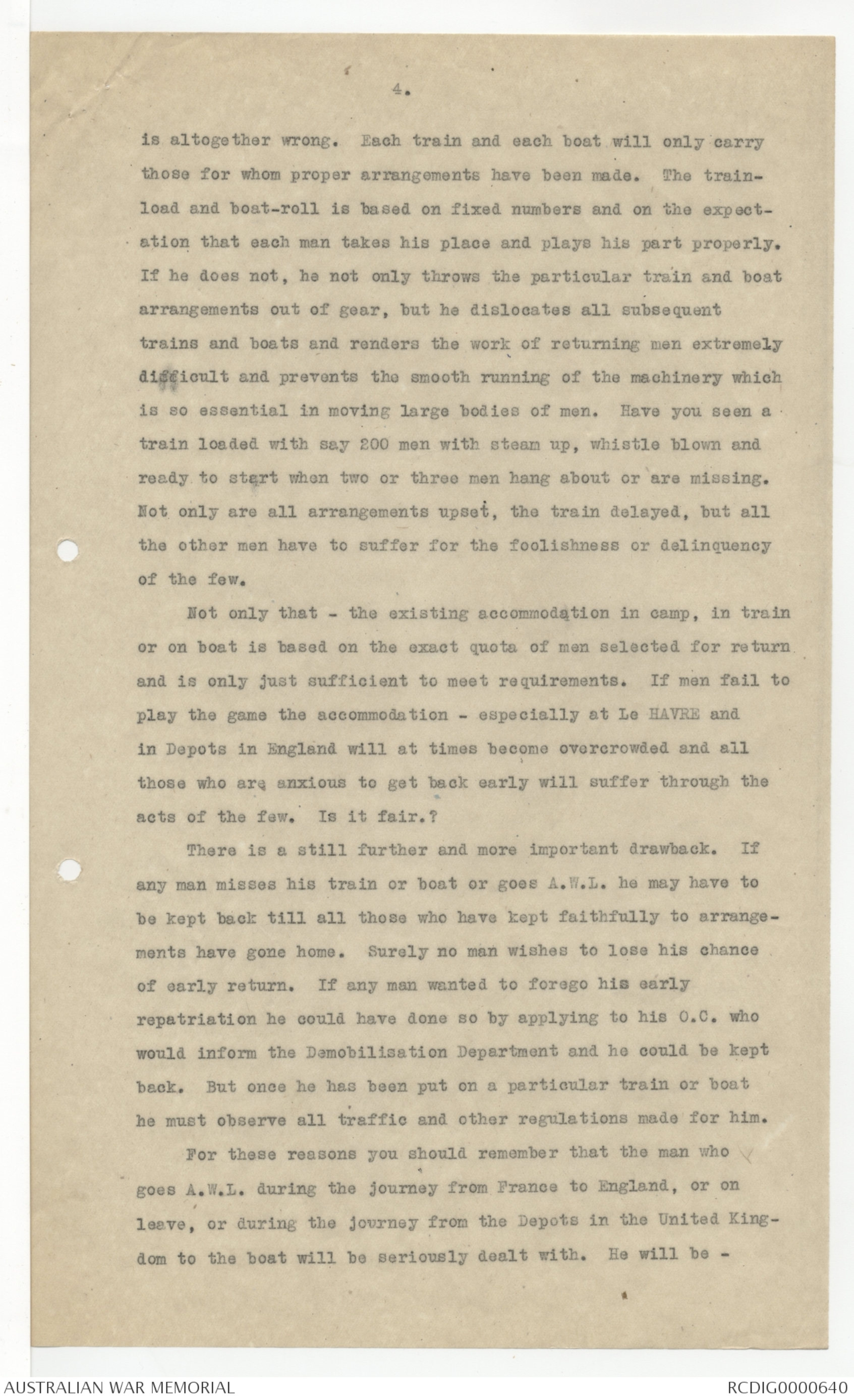
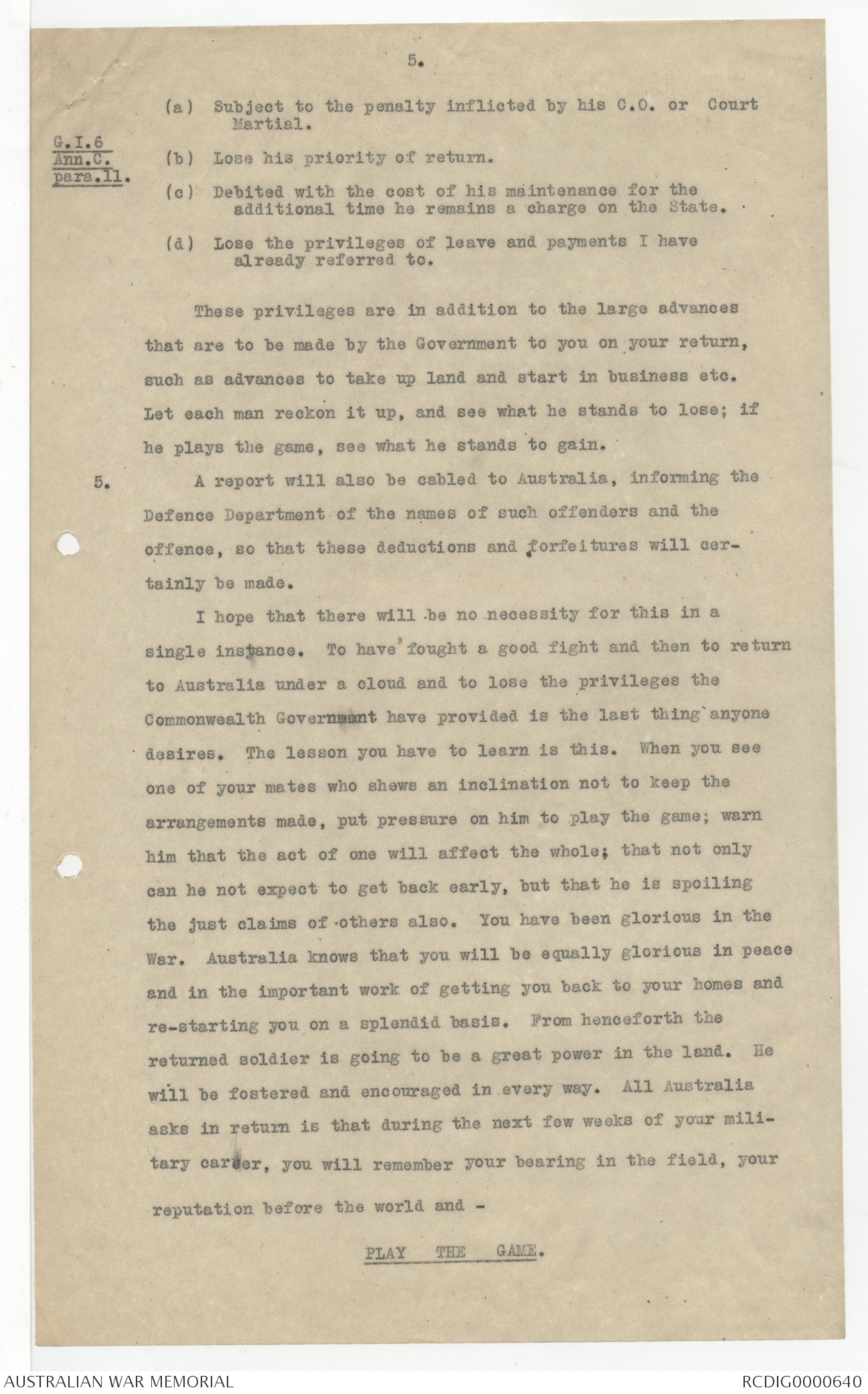
30/1/19
RD
LtCol. D. Fulton
1. Subject to the approval of the G.O.C, A.I.F in Egypt, I shall be
glad if you assume the appointment and carry out the duties
of Assistant Director-General of Repatriation and Demobilization
of the A I.F. in Egypt and Salonika.
2. Copies of "General Instructions" have been issued to you and
will continue to be issued to you as published.
3. Insofar as these Instructions are found to be inapplicable to the situation
in Egypt or to the troops to be dealt with by you, you are at
liberty to vary them, subject to the approval of the G.O.C, A.I.F in
Egypt. - As however these Instructions are to a large extent based on policies upon
laid down by decisions of the Commonwealth Government, and by of the Right
Hon. the Prime Minister, you should not vary depart from them in respect of
any matter which is based upon involves any important aquestion of policy, and particularly of financial policy.
4. You are hereby empowered to exercise all the financial authorities
covered by these Instructions, and also to exercise on my behalf all
discretionary powers therein vested in me. || 5 I enclose herewith
a delegation to you to incur expenditure to the full extent of
the financial powers which I myself hold. - It may become
necessary for you to produce such delegation to the Auditor's
representative in duplicate in Egypt.- an instruction to the Chief paymaster.
5. Copy of an instruction to the Chief Paymaster A.I.F. dated 30/1/19
instructing him to recognize your delegated financial powers. He will also
so inform his representative in Egypt.
6.- I shall be glad if you will keep me advised by letter & by cable
of the progress of your Demobilization; and I request you to refer
to me for any advice or assistance that I may be able to render
LtGen.
31/1/19
FOREWORD BY THE DIRECTOR-GENERAL
_______________________
"THE OFFICER COMMANDING THIS TRANSPORT IS,
ACTUALLY AND MORALLY, PERSONALLY RESPONSIBLE
FOR EVERYTHING CONNECTED WITH THE VOYAGE SO
FAR AS CONCERNS THE TROOPS COMMITTED TO HIS CHARGE.
HE IS VESTED WTH COMPLETE POWERS TO REGULATE
AND CONTROL THEIR GOOD CONDUCT AND WELL-BEING.
IT RESTS WITH HIM WORTHILY TO DISCHARGE, TO THE
UTMOST OF HIS ABILITY, THIS GRAVE RESPONSIBILITY
TOWARDS THE MEN AND TOWARDS AUSTRALIA, AS THE
LAST, BUT NOT THE LEAST IMPORTANT, OF THE SERVICES
WHICH HE WILL BE CALLED UPON TO RENDER FOR HIS
COUNTRY IN THE GREAT WAR. HE IS EMPOWERED TO
ENLIST AND AVAIL HIMSELF OF THE ASSISTANCE OF
EVERY OFFICER AND N.C.O. ON BOARD HIS SHIP. IT
SHOULD BE A MATTER OF HONOUR WITH HIM CONSCIENTIOUSLY
TO CARRY INTO EFFECT THE WHOLE OF THE
REGULATIONS CONTAINED IN THIS PAMPHLET.
John Monash
Lieut.-General,
Director-General.
Repatriation and Demobilisation, A.I.F.
Date
Printed about 31/1/19
2
DEPT. OF REPATRIATION AND DEMOBILISATION,
AUSTRALIAN [IMPERIAL FORCE]
54, VICTORLA STREET, S.W.I.
To: -
1. You are appointed to the command of the Troops
returning to Australia per H.M.T.
embarking at.................
on..............next, the.............instant.
2. This pamphlet contains your instructions. It will be
treated as a Confidential document and will be kept in your
possession until the completion of the voyage.
3. On completion of the voyage you will sign and date
this page and forward the pamphlet to the Defence Department
together with other papers connected with the ship.
4. Please acknowledge receipt.
John Monash
Lieut.-General,
Director-General
of Repatriation and Demobilisation, A.I.F.
Forwarded to Defence Department, Melbourne.
.......
Signature.
...............
Date
WJD/HM.
Pls Return
RLC
Lecture
1.2.19
REPATRIATION AND DEMOBILISATION DEPARTMENT.
Draft Notes for Guidance of Lecturer.
1. I wish to say a few words to you about the arrangements
for your Demobilisation and your Repatriation to Australia.
Australia is proud of her troops - no nation prouder, and she is
taking every opportunity to show her gratitude to them for the
wonderful reputation they have established in the Field. Every
possible benefit that can be devised has already been arranged
by the Government in Australia and any soldier who desires to
obtain information as to these proposals may ask me after this
lecture, and may also be supplied with pamphlets dealing with
the subject from every point of view.
2. The present arrangements for your Demobilisation are as
follows :-
(1) The Quota (or Draft) will proceed from LeHAVRE to WEYMOUTH
[*G.1.10*] and from thence to one of the Depots in the United Kingdom. From
[*Sec.D.*] the time a man leaves his Unit till the day of sailing for Australia
[*para.10*] will be about six weeks.
(2) Whilst at the Depot 14 days Embarkation leave will, if
[*Allowed*] if possible, be granted, but there may be some difficulty owing to
[*84/- if*] difficulties of railway transport, as the pressure on the
[*paybook*] railways in England is very great.
[*debit*]
[*does not*]
[*exceed*]
[*?.G.I.*]
[*10 par.43*]
(3) Not less than twelve days before embarkation to Australia
the men will be assembled at the Depot in order to prepare Boat
Rolls, and for financial and medical matters to be arranged.
(4) Men will be embarked according to Divisions, but dates of
sailing owing to shipping difficulties are approximate only.
3. (a) As soon as your name appears on the "Boat Roll" you will
be entitled to draw 30 days pay, at the net drawing rate,
[*G.1.10*] provided you have not previously drawn the 84/- for your 14 days
[*para.43*] leave.
(b) During the voyage if necessary Credit exists in Paybook
[*G.I.6*] payment may be made to Officers and Nurses £l0; Sgts. and higher
[*Ann.C.*] 25; Other Ranks £3.
[*para.2.*]
2.
[*G.I.6*] (c) Immediately prior to disembarkation you may draw £lO (if
[*Ann.C*] you have left Australia before 1917 and you have credit) and £5
[*para.3.*] in all other cases.
(d) Leave on full pay will be granted in Australia on the
basis of 7½ days for every six months abroad, but not exceeding
60 days, from date of embarkation and 3/- subsistence allowance
[*G.1.6*] for each day of leave; in other words 9/- a day. An early 1915
[*Ann.C.*] man would therefore be entitled to receive 60 days leave. He
[*para.5.*] can also work and earn money during that period if he likes.
If any man has had long service furlough he gets 14 days leave
only and without subsistence allowance.
[*G.1.10*] (e) Issue of new Service Jacket, breeches, hat and puttees, at
[*A.?A.*] first port of call in Australia or immediately on disembarkation.
[*Sec.P.*] Save regulation colour patches and chevrons for this issue.
[*para.4.*]
[*G.1.6*] (f) Within 4 days of landing in Australia the soldier is entitled
[*---do.*] to draw all his Pay and also 75% of his deferred pay; the balance
[*Ann.C.*] as soon as Pay Book A/c. is finalised.
[*para.7.*]
[*do.*] (g) If you have enlisted in one Military District, but home
[*para.9.*] and relatives are in another, you may disembark and be discharged
in that other Distriet.
This is the very best arrangement that can be made. Though
the Armistice is signed the War is not yet over. Demobilisation
is a difficult job. It must be fair, and it has to be gradual.
The shipping facilities are necessarily limited. With English
troops it is only a trip across the channel; with you, it is a
journey of 12,000 miles. You know how many ships have been sunk;
how many trains destroyed; how much demand there is upon ships
and trains for all the millions of men who have to be shifted,
and for feeding the starving population of Europe. We have,
however, pressed for and got as many ships as possible, but the
number is necessarily limited. Everybody cannot go at once
and the most deserving, i.e. those of long service must go first.
4. If Australia is treating her men so generously she is entitled
to expect that all troops will play the game and assist
3.
her. I want every man to feel that he is the guardian of the
honor of Australia and to USE HIS INFLUENCE WITH HIS MATES
towards making the demobilisation of the troops run smoothly.
One man going A.W.L. will upset all arrangements at this important juncture. It is difficult enough to get all the thousands
of men disembarked when everybody plays the game; it is impossible
to do the job properly if men do not carry out instructions. If
you were going on a long and important journey you would take
every care you did not miss the boat or delay your party. How
much more important is it, where thousands of men are concerned,
that one should not upset the whole arrangements of himself and
the others.
Let me give you a few illustrations of the derangement of
our work in arranging for your return if you go A.W.L. Train,
shipping and depot accommodation is limited. We are striving
to get as many trains and boats as possible and we cannot work
on a margin by allowing for men who drop out of a train-load or
boat-roll.
When a man hands over his rifle and equipment he may feel
inclined to say "The War is over, I'm a civilian again and I can
do as I like". That is absolutely wrong. The war is not over,
you are still a soldier and you must carry out to the letter
every detail of the programme arranged for you; otherwise confusion
and loss of privileges and priority of return will be
lost to you.
Take another illustration - If you had arranged to go on
a journey with your friends in a boat that could seat 40 and
every man said "I'm going to sit where and how I like", so that
the boat held only 30, that represents a loss of one quarter of
the sitting space and 10 of your mates lose the chance of
making the trip. It is no use thinking another boat may be
available later. All the other boats will be filled by those
who have kept to the arrangements made for them.
If again a man says "Its alright; it won't matter if I miss
this train or this boat, I'll be sent on the next" - That opinion
4.
is altogether wrong. Each train and each boat will only carry
those for whom proper arrangements have been made. The trainload
and boat-roll is based on fixed numbers and on the expectation
that each man takes his place and plays his part properly.
If he does not, he not only throws the particular train and boat
arrangements out of gear, but he dislocates all subsequent
trains and boats and renders the work of returning men extremely
difficult and prevents the smooth running of the machinery which
is so essential in moving large bodies of men. Have you seen a
train loaded with say 200 men with steam up, whistle blown and
ready to start when two or three men hang about or are missing.
Not only are all arrangements upset, the train delayed, but all
the other men have to suffer for the foolishness or delinquency
of the few.
Not only that - the existing accommodation in camp, in train
or on boat is based on the exact quota of men selected for return
and is only just sufficient to meet requirements. If men fail to
play the game the accommodation - especially at Le HAVRE and
in Depots in England will at times become overcrowded and all
those who are anxious to get back early will suffer through the
acts of the few. Is it fair.?
There is a still further and more important drawback. If
any man misses his train or boat or goes A.W.L. he may have to
be kept back till all those who have kept faithfully to arrangements
have gone home. Surely no man wishes to lose his chance
of early return. If any man wanted to forego his early
repatriation he could have done so by applying to his O.C. who
would inform the Demobilisation Department and he could be kept
back. But once he has been put on a particular train or boat
he must observe all traffic and other regulations made for him.
For these reasons you should remember that the man who
goes A.W.L. during the journey from France to England, or on
leave, or during the journey from the Depots in the United Kingdom
to the boat will be seriously dealt with. He will be -
5.
(a) Subject to the penalty inflicted by his C.0. or Court
[*G.I.6*] Martial.
[*Ann.C.*] (b) Lose his priority of return.
[*para.11.*] (c) Debited with the cost of his maintenance for the
additional time he remains a charge on the State.
(d) Lose the privileges of leave and payments I have
already referred to.
These privileges are in addition to the large advances
that are to be made by the Government to you on your return,
such as advances to take up land and start in business etc.
Let each man reckon it up, and see what he stands to lose; if
he plays the game, see what he stands to gain.
5. A report will also be cabled to Australia, informing the
Defence Department of the names of such offenders and the
offence, so that these deductions and forfeitures will certainly
be made.
I hope that there will be no necessity for this in a
single instance. To have fought a good fight and then to return
to Australia under a cloud and to lose the privileges the
Commonwealth Governent have provided is the last thing anyone
desires. The lesson you have to learn is this. When you see
one of your mates who shows an inclination not to keep the
arrangements made, put pressure on him to play the game; warn
him that the act of one will affect the whole; that not only
can he not expect to get back early, but that he is spoiling
the just claims of others also. You have been glorious in the
War. Australia knows that you will be equally glorious in peace
and in the important work of getting you back to your homes and
re-starting you on a splendid basis. From henceforth the
returned soldier is going to be a great power in the land. He
will be fostered and encouraged in every way. All Australia
asks in return is that during the next few weeks of your military
career, you will remember your bearing in the field, your
reputation before the world and -
PLAY THE GAME.
 Sam scott
Sam scottThis transcription item is now locked to you for editing. To release the lock either Save your changes or Cancel.
This lock will be automatically released after 60 minutes of inactivity.